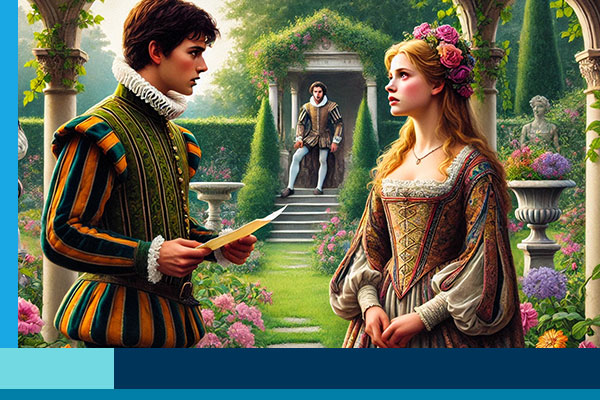Shakespeare’s play “Twelfth Night” which debuted 400 years ago could be considered one of the original rom-coms (romantic comedies) and many contemporary movies seem to borrow from the plot of this popular production.
Set in the city of Illyria where music truly is “the food of love” the duke Orsino has his sights set on a noblewoman, Olivia. However, Olivia is mourning the recent deaths of her father and brother and has no interest in love.
Meanwhile a teenage girl, Viola finds herself on the shores of Illyria after her ship sinks off the coastline. Viola disguises herself as a eunuch named Cesario in order to find work. “Cesario” quickly becomes Orsino’s close confidant, and finds herself falling in love with the Duke, which is particularly awkward when Orsino sends Viola to woo Olivia on his behalf. When Viola delivers Orsino’s messages, Olivia isn’t interested in what Orsino has to say—it is “Cesario” that catches her attention! As this love triangle sorts itself out we are pulled into Viola’s conundrum: is she loved for who she is or who she presents herself to be?
We can easily think gender issues are a contemporary challenge for modern society but Shakespeare faced critical judgement from Puritan Christians in part because theatre actors were all men playing women’s roles. Older still are the Biblical accounts of several individuals who challenged the gender expectations of their time. Here are a few examples:
Daughters of Zelophehad (Numbers 27:2-7) The promised land was to be divided by male heirs but since Zelophehad had only five daughters they were in a position to lose their inheritance. Through their bold plea for justice God honoured their rights to represent their family in a way previously given only to sons.
Deborah (Judges 4-5): Deborah was a prophetess and judge of Israel, roles that were predominantly male during her time. She led Israel into battle and provided guidance and judgment to the people.
Jael (Judges 4:17-22): Jael, a woman, played a pivotal role in the defeat of Sisera, a Canaanite general. She killed him by driving a tent peg through his temple, an act of bravery and violence typically associated with male warriors.
Huldah (2 Kings 22:14-20; 2 Chronicles 34:22-28): Huldah was a prophetess consulted by King Josiah to explain the Book of the Law. Her authoritative role as a spiritual leader and instructor of a king does not align with male headship ideology.
Mary Magdalene (John 20:11-18): Mary Magdalene is the first to witness and announce the resurrection of Jesus, a significant role as the bearer of this critical news. In this patriarchal society, women were not deemed credible witnesses in the courts.
The Ethiopian Eunuch (Acts 8:26-39): Eunuchs in the ancient world often did not fit traditional gender roles, and the Ethiopian eunuch’s prominent role in Acts signifies the inclusion of gender-nonconforming individuals in the early Christian community.
Jesus Christ (John 13:1-17): Jesus’ act of washing His disciples’ feet, a task typically reserved for the lowest servants and often associated with women’s work, broke social and gender norms of His time.
In these examples may others who struggle to fit into restrictive categories find comfort in God’s accepting love and may we all remember an individual’s purpose and worth in the eyes of God is not based on gender.


